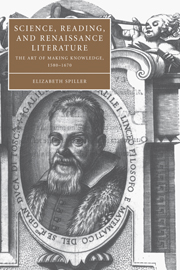Book contents
- Frontmatter
- Contents
- List of figures
- Acknowledgments
- Introduction: making early modern science and literature
- 1 Model worlds: Philip Sidney, William Gilbert, and the experiment of worldmaking
- 2 From embryology to parthenogenesis: the birth of the writer in Edmund Spenser and William Harvey
- 3 Reading through Galileo's telescope: Johannes Kepler's dream for reading knowledge
- 4 Books written of the wonders of these glasses: Thomas Hobbes, Robert Hooke, and Margaret Cavendish's theory of reading
- Afterword: fiction and the Sokal hoax
- Notes
- Index
- Cambridge Studies in Renaissance Literature and Culture
1 - Model worlds: Philip Sidney, William Gilbert, and the experiment of worldmaking
Published online by Cambridge University Press: 22 September 2009
- Frontmatter
- Contents
- List of figures
- Acknowledgments
- Introduction: making early modern science and literature
- 1 Model worlds: Philip Sidney, William Gilbert, and the experiment of worldmaking
- 2 From embryology to parthenogenesis: the birth of the writer in Edmund Spenser and William Harvey
- 3 Reading through Galileo's telescope: Johannes Kepler's dream for reading knowledge
- 4 Books written of the wonders of these glasses: Thomas Hobbes, Robert Hooke, and Margaret Cavendish's theory of reading
- Afterword: fiction and the Sokal hoax
- Notes
- Index
- Cambridge Studies in Renaissance Literature and Culture
Summary
In Richard II, the dying John of Gaunt describes the England he once knew as a special type of place:
This royal throne of kings, this sceptred isle,
This earth of majesty, this seat of Mars,
This other Eden, demi-paradise,
This fortress built by Nature for herself
Against infection and the hand of war,
This happy breed of men, this little world,
This precious stone set in the silver sea.
John of Gaunt's speech has traditionally stood as both example and expression of an idea of high, imaginative literature. Gaunt's nostalgia seems in this context to provide the groundwork for a critical nostalgia for the literature of the Renaissance. Like John of Gaunt's England, literature exists in a separate place, an ideal if perhaps defensive paradise set apart from the rest of the world both morally and physically. From such a critical perspective, Shakespeare seems to anticipate how his works have become an image of transcendent and transforming genius: if we say that we would choose Shakespeare's Works as our single textual companion on some desert island, we suppose that his works have a power to transform a waste isle into a more bearable paradise. Despite its almost mythic aesthetic power, Shakespeare's description does nonetheless have a specific historical context. The language of transcendent separation that is part of what generates such strong responses to Gaunt's speech itself participates in an ongoing contemporary debate about worldmaking in early modern art, literature, and natural philosophy.
- Type
- Chapter
- Information
- Science, Reading, and Renaissance LiteratureThe Art of Making Knowledge, 1580–1670, pp. 24 - 58Publisher: Cambridge University PressPrint publication year: 2004



